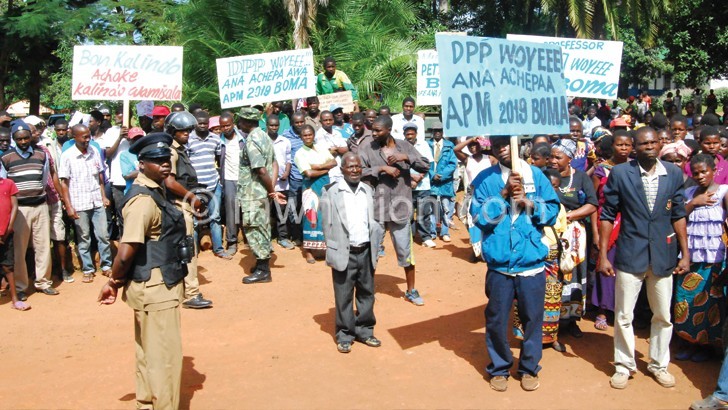Parties faulted ahead of 2019
Political analysts have cited intolerance and greed as factors fuelling endless infighting in the country’s main political parties ahead of the May 2019 Tripartite Elections.
The commentators expressed their sentiments in separate interviews with The Nation amid ongoing leadership squabbles in the governing Democratic Progressive Party (DPP), main opposition Malawi Congress Party (MCP) and Alliance for Democracy (Aford). For People’s Party (PP), it is not clear how it will contest the elections whereas the United Democratic Front (UDF) is also not spared the internal wrangles.

Centre for Multiparty Democracy (CMD) executive director Kizito Tenthani said the developments were a sign of lack of open debate within political parties.
He said: “What would be a cause for worry is the tendency for some parties to silence other quarters from expressing their views on how their political parties should be led. One would want to believe that political parties in the democratic setting should offer that space where dissenting views are heard, even the views that are challenging the leadership of political parties.
“What we are seeing borders on the weaknesses of our political parties. Our political parties need to reign over personal or individual interests. Political parties should look beyond the limited interests. They should look at the greater good for the party and the country at large.”
Tenthani, whose organisation works to build the capacity of political parties, observed that within the major political parties and the country’s style of democracy, at large, “the culture of debate is very limited if not completely nonexistent”.
He said: “Thus, as a result, while political parties are going through these ‘growth pains’ that, if managed properly, can lead to the emergence of stronger parties. The pressure is there of course for the parties since apart from managing their internal strife, they also have to prepare and manage the elections.
“Indeed, as it looks, one may already see that whichever way parties emerge from these conflicts, they will be bruised in one way or the other. The parties will have to manage and recover and then organise themselves for the elections. The earlier they resolve the internal strifes the better it would be for them to position themselves for the elections.”
Tenthani advised the parties to respect their respective constitutions and accept dissenting views. He warned that creating “father figures” who cannot be questioned is counterproductive.
In a separate interview, Public Affairs Committee (PAC) spokesperson Father Peter Mulomole said the state of affairs in the country’s major parties, particularly DPP and MCP, was not healthy for democracy.
He said: “That is why the [Catholic] bishops are saying we need intraparty democracy to flourish. It seems we have personalised the parties. They no longer belong to the people. It is very unfortunate that things are happening a year before the elections; the problem is how they are handled.
“If we had quality leadership in the parties, they would be handled [the issues] professionally. There is so much greed and emotion. It is normal to differ in families and parties, but you have to resolve the differences.”
Mulomole urged tolerance in the parties to achieve lasting solution to the ongoing fights.
Political consultant and long-time politician Humphrey Mvula, who has been a senior UDF member and worked with PP, said the current situation was unprecedented in the country’s history.
But MCP spokesperson Ezekiel Ching’oma downplayed the challenges facing his party, arguing the party is run on democratic principles compared to its counterparts.
He said: “MCP is the only true party that belongs to people of Malawi. It is not a family party as is the case with other parties. Nepotism and corruption is entrenched in our system of governance because since the inception of multiparty democracy, people have been voting for personal parties into power. For over 20 years, Malawi has had a cousin-sister system of government.”
His DPP counterpart, Francis Kasaila, said the party’s infighting was being overblown. He blamed the situation on failure by some people with dissenting views to follow right structures in expressing their viewpoints.
Malawi will hold tripartite elections in May next year to elect the President and Vice-President, 193 members of Parliament and 462 ward councillors. n





